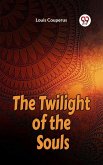In "The Twilight of the Souls," Louis Couperus crafts a rich tapestry of human emotion and existential contemplation, exploring the complex interplay between the individual and the societal pressures of the late 19th century. Set against the backdrop of a decaying aristocracy, the narrative weaves philosophical reflections with a poetic style, blending Symbolism and Naturalism to delve deep into the psyche of its characters. Couperus employs lush descriptions and lyrical prose, drawing readers into a world that oscillates between the vibrancy of life and the inevitability of decay, encapsulating the soul's twilight moments with haunting beauty. Louis Couperus, an eminent figure in Dutch literature, was known for his profound insights into human nature and society, which he vividly conveyed in his works. Born in 1863 in The Hague, his experiences in an affluent yet changing world undoubtedly influenced his portrayal of the psychological struggles of his characters. Couperus'Äôs fascination with themes of destiny, identity, and the interplay of social norms positions "The Twilight of the Souls" as a key exploration of the transitional phases in individual lives and within society. For readers drawn to introspective narratives that challenge conventional boundaries, "The Twilight of the Souls" is an indispensable addition to the literary canon. It invites contemplation of both the beauty and melancholy inherent in the human experience, offering a timeless reflection on the fragility of existence that resonates with contemporary readers.
Dieser Download kann aus rechtlichen Gründen nur mit Rechnungsadresse in A, B, BG, CY, CZ, D, DK, EW, E, FIN, F, GR, H, IRL, I, LT, L, LR, M, NL, PL, P, R, S, SLO, SK ausgeliefert werden.
Hinweis: Dieser Artikel kann nur an eine deutsche Lieferadresse ausgeliefert werden.









